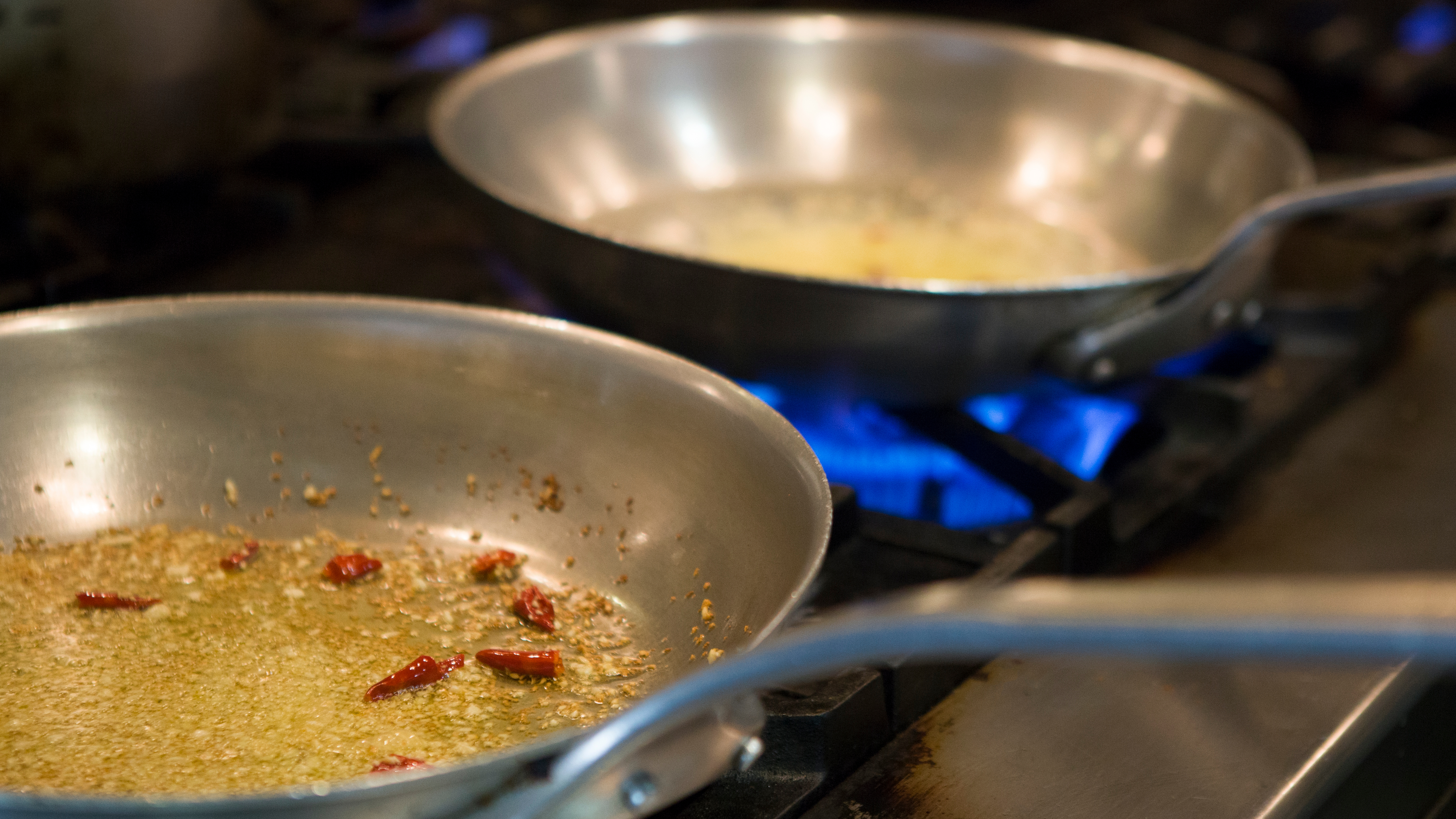What's The Best Oil For Different Sauté Needs?
Wander into any high-end gourmet store, or even a normal grocery store, and you can feel immediately overwhelmed by the various cooking oil options. Personally, I've watched enough Rachael Ray episodes so that I'm always stocked with EVOO (extra-virgin olive oil). And I usually toss some sesame oil into whatever stir-fry or Asian-leaning dish I'm making—primarily because I really, really love the smell.
But what about grapeseed oil? Should I be using that? What are these different flash point options some of these bottles are talking about? Corn oil is bad, right? But is canola oil good? Should I use that when I'm looking for a milder taste than olive oil can bring with it?
Flummoxed per usual, I turned to some chefs to find their sauté oil preferences. Some of them offered some surprising contenders. And it looks like Rachael Ray may be onto something after all.
High-temperature sautéing
Ryan Brosseau, chef of Le Sud, which is scheduled to open in Chicago this summer, uses a sauté option that is currently missing from my pantry. "My preferred universal vegetable oil is rice bran oil. It has close to zero flavor and a very high smoke point." That high smoke point, by the way, refers to an oil that can stay at a high temperature for a considerable period of time without breaking down. So for deep-frying or high-heat sautés, high smoke point oils like rice bran, peanut, and grapeseed work well.
But rice bran oil has even more uses, says Brosseau: "It works great for sautéing and searing, but is also great for sauce-making—think aioli or vinaigrettes. Grapeseed oil is another great oil for the exact same reasons, but is about double the price (it may might be easier to find for a home cook). I find really anything else adds an off-flavor, as far as vegetable oil goes."
If you need to use high heat and your dish incorporates some Asian flavors—stir-fry, for example—"peanut oil is the best choice, thanks to its high smoke point and clear flavor," according to Sharon Graves, founder and proprietor of BLVD Kitchen in Sherman Oaks, California.
All-purpose sautés
Olive oil seems to be the standard, though, so Brosseau says: "If you want to use olive oil, use the best olive oil you can get for every purpose. If you want olive oil flavor, but don't want to use too much because of cost, use some olive plus some rice bran or grapeseed."
Chef John Sierp of Raise New York likes olive oil as well, but "of course depends on what you're sautéing. I generally like to use a neutral oil like canola or vegetable so I can flavor it myself with aromatics and/or herbs. They can take higher heat if it's necessary to cook something quick, sear, or fry. I do also like using extra virgin olive oil for things that don't require higher heat. It lends great flavor, body, and a nice texture."
Chef Luis Montesinos of Jaleo at The Cosmopolitan Las Vegas gets even more specific with his olive oil: "We only use Spanish extra virgin olive oil at Jaleo—it's an arbequiña varietal. A blended oil won't have what Spanish EVOO has, which is a fruitiness that's delicious and complex."
The neutrality and versatility of EVOO also works well for Graves, who uses a light olive oil for sautéeing onions, garlic, or shallots for a sauce or soup. "But if you are cooking eggs or something delicate, by all means go with butter. Butter's also the go-to for good steaks and chops."
A tropical option
I also love the smell of coconut oil, but I never really considered it as a sautéing option. Turns out, I've been missing out. Angela Garbacz, owner and head pastry chef of Goldenrod Pastries in Lincoln, Nebraska, enthuses, "I use coconut oil almost exclusively. I love its flavor, and the way it browns [food] feels stronger than other oils." Chef Jeff Catalano, executive chef of Red Frog Beach Island Resort & Spa in Bocas Del Toro, Panama, agrees, "I personally like to use local, homemade coconut oil that gives our food a nice touch of Caribbean flare."
I walked away from these various conversation with my head spinning, but some further reading (thanks, Cook's Illustrated) helped organize my sautéing options a bit further. Namely: For dishes with preparations that will need high smoke points, go with a rice bran, grapeseed, or peanut oil. For versatility (so, most other sauté needs), use a good quality extra-virgin olive oil. Butter can work well as a special add. And you better believe that I'm going to try out coconut oil in my sauté pan as soon as humanly possible.
